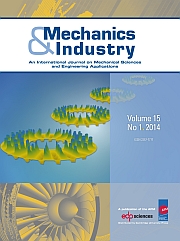Crossref Citations
This article has been cited by the following publications. This list is generated based on data provided by
Crossref.
Pathare, Pankaj B.
and
Opara, Umezuruike Linus
2014.
Structural design of corrugated boxes for horticultural produce: A review.
Biosystems Engineering,
Vol. 125,
Issue. ,
p.
128.
Fadiji, Tobi
Coetzee, Corné J.
Berry, Tarl M.
Ambaw, Alemayehu
and
Opara, Umezuruike L.
2018.
The efficacy of finite element analysis (FEA) as a design tool for food packaging: A review.
Biosystems Engineering,
Vol. 174,
Issue. ,
p.
20.
Luong, V. Dung
Abbès, Fazilay
Abbès, Boussad
Duong, P. T. Minh
Nolot, Jean-Baptiste
Erre, Damien
and
Guo, Ying-Qiao
2018.
Proceedings of the International Conference on Advances in Computational Mechanics 2017.
p.
369.
Fadiji, Tobi
Berry, Tarl M.
Coetzee, Corne J.
and
Opara, Umezuruike Linus
2018.
Mechanical design and performance testing of corrugated paperboard packaging for the postharvest handling of horticultural produce.
Biosystems Engineering,
Vol. 171,
Issue. ,
p.
220.
Pathare, Pankaj B.
and
Opara, Umezuruike Linus
2018.
Reference Module in Food Science.
Archaviboonyobul, Tita
Chaveesuk, Ravipim
Singh, Jay
and
Jinkarn, Tunyarut
2020.
An analysis of the influence of hand hole and ventilation hole design on compressive strength of corrugated fiberboard boxes by an artificial neural network model.
Packaging Technology and Science,
Vol. 33,
Issue. 4-5,
p.
171.
Mukama, Matia
Ambaw, Alemayehu
and
Opara, Umezuruike Linus
2020.
Advances in design and performance evaluation of fresh fruit ventilated distribution packaging: A review.
Food Packaging and Shelf Life,
Vol. 24,
Issue. ,
p.
100472.
Shi, Dongyan
Ma, Hui
He, Dongze
and
Gou, Yuxin
2020.
A remaining useful life estimation model of drop system based on data driven and Bayesian theory.
Structures,
Vol. 28,
Issue. ,
p.
329.
Molina, Eduardo
Horvath, Laszlo
and
West, Robert L.
2021.
Development of a Friction-Driven Finite Element Model to Simulate the Load Bridging Effect of Unit Loads Stored in Warehouse Racks.
Applied Sciences,
Vol. 11,
Issue. 7,
p.
3029.
Ambaw, Alemayehu
Fadiji, Tobi
and
Opara, Umezuruike Linus
2021.
Thermo-Mechanical Analysis in the Fresh Fruit Cold Chain: A Review on Recent Advances.
Foods,
Vol. 10,
Issue. 6,
p.
1357.
Berry, Tarl. Michael.
Defraeye, Thijs.
Shrivastava, Chandrima.
Ambaw, Alemayehu.
Coetzee, Corné.
and
Opara, Umezuruike. Linus.
2022.
Designing ventilated packaging for the fresh produce cold chain.
Food and Bioproducts Processing,
Vol. 134,
Issue. ,
p.
121.
Di Russo, Franco Maria
Desole, Maria Maria
Gisario, Annamaria
and
Barletta, Massimiliano
2023.
Evaluation of wave configurations in corrugated boards by experimental analysis (EA) and finite element modeling (FEM): the role of the micro-wave in packaging design.
The International Journal of Advanced Manufacturing Technology,
Vol. 126,
Issue. 11-12,
p.
4963.
Goh, W I
Kamaruddin, S
Mutalib, A N
Rahman, A F
and
Mohamad, N
2024.
Computational study on lightweight concrete beam incorporating palm oil fuel ash (POFA) and mussel shell ash (MSA) as partial cement replacement.
IOP Conference Series: Earth and Environmental Science,
Vol. 1347,
Issue. 1,
p.
012087.
Hafizh, Muhammad
Mecheter, Asma
Tarlochan, Faris
and
Pathare, Pankaj B.
2024.
Evaluation of Bruising Susceptibility and Response of Pears under Impact Loading through Finite Element Analysis.
Applied Sciences,
Vol. 14,
Issue. 6,
p.
2490.
Di Russo, Franco Maria
Desole, Maria Pia
Gisario, Annamaria
Genovesi, Annalisa
and
Barletta, Massimiliano
2024.
Study and Design of Corrugated Cardboard Trays With Microwaves by Experimental Analysis (EA) and Finite Element Methods (FEM).
Packaging Technology and Science,
Vol. 37,
Issue. 9,
p.
857.
Xi, Huifeng
Shu, Xiangbo
Chen, Manjie
Zhang, Huanliang
Huang, Shi-qing
and
Xiao, Heng
2024.
Drop cushioning dynamic effects of corrugated cardboard with effective anisotropic constitutive model.
Multidiscipline Modeling in Materials and Structures,
Vol. 20,
Issue. 1,
p.
142.


